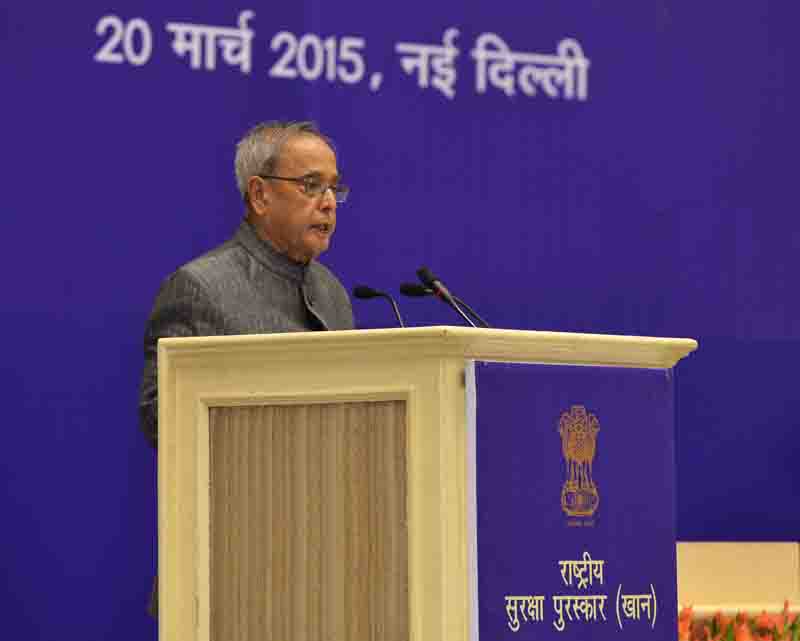
1.It gives me great pleasure to be present amidst you to recognize the outstanding performance of award winners of the National Safety Awards (Mines) for the years 2011 and 2012. These awards were instituted in 1983 to promote a competitive spirit amongst mine operators to improve safety standards in mines. I would like to congratulate all the outstanding performers in the field of mine safety who have been awarded today.
Ladies and Gentlemen:
2.The Indian mining industry has undergone significant change over the last few decades. Intensive mechanization and use of new technology has driven production to high levels. Despite a subdued performance in recent years, coal production was estimated at 492 million tonne and iron ore at 133 million tonne in 2013-14. The total value of production of all minerals, including fuel, metallic and non-metallic minerals, was estimated at Rs. 2.3 lakh crore for 2013-14. Robust output in the mineral sector has contributed to the achievement of our growth objectives in no small measure.
3.To meet the growing demand for coal and other minerals, core mining operations are increasingly being outsourced to mining operators. The business model in this sector requires them to run on thin profit margins. Sometimes, investments in safety standards are ignored for short term gains. In the absence of adequate safety precautions, mining – which is a hazardous industry, constantly challenged by nature - becomes prone to accidents.
4.A safe and decent work environment is asine qua non of industrial progress. Effective prevention of work-related accidents, injuries and occupational diseases could render sizeable socio-economic benefits. Organizations in the mining industry need to proactively address potential safety problems through a comprehensive approach. A culture of prevention rather than a culture of reaction is required in the mining industry as a value-driven commitment towards zero tolerance to such incidents.
Ladies and Gentlemen:
5.In the sphere of safety, a multi-pronged strategy - comprising legislation; self-regulation; worker participation in safety management; and introduction of safety management systems based on risk assessment of workplace - has resulted in a steady decline in fatality rates. Moreover, mine safety has benefitted from improvements visible in mode of access into mine, transportation system for men and materials, strata control, ventilation of underground workings, mechanization of operations and use of safety gadgets, improved rescue procedures, better training, and health surveillance. Though we are yet to reach the goal of ‘zero harm’, this paradigm shift in approach to mine safety can justifiably be termed a silent revolution.
6.Yet, there are emerging challenges to face. With expanding scale of mining operations, intensification of mechanization and extension of mining activities to adverse geo-mining conditions, the management of occupational health and safety (OHS) issues are likely to become more complex. OHS challenges have to be dealt at both the mine level as well as business level.
7.The mining industry has to address crucial aspects like standardisation of OHS programmes, deployment of effective communication tools, measures for enhanced productivity and expectations of the society. Mitigating these challenges call for enhanced application of information technology solutions. An OHS management system can deliver considerable benefits, including minimizing operational risks and liabilities, meeting regulatory requirements and customer demands, improving corporate image, and achieving competitive advantage.
Ladies and Gentlemen:
8.Introduction of state-of-the-art technology in mining activity can lead to improvement in safety, besides productivity and financial gains. Mines that have adopted modern technology have expanded their businesses by exploiting deposits of lower grades which were hitherto considered uneconomic. At the same time, they have gained extensively in terms of safety as improved technology has raised the safety profile of mining operations.
9.Another important factor that can elevate safety standards and prevent accidents is training of the mining workforce. It is necessary to have in place an effective industry-wise skill development mechanism to achieve accident-free mining. For that, a proper understanding is needed about the inter-dependence between work-place environment, technology and operational skill requirement.
10.Government initiatives to augment mineral production ought to have a large skilled manpower which calls for modern training facilities. Along with that, the demand for trainers will also be high. The mineral industry should take the lead in filling this gap by setting up world-class centres for capacity building and skill development of mine workers. Such training should impart real life skills to mine workers for identification of hazards and avoidance of dangers in routine and non-routine tasks.
Ladies and Gentlemen:
11.Concerns about worker safety should engage attention at the highest corporate level. Safety and employee health should not only be a part of a company’s mission but also core elements of its business plan, inseparable from productivity and profitability goals. I urge the apex management in mining companies to usher in an effective safety management system.
12.Mahatma Gandhi had said and I quote: "The future depends on what you do today” (unquote). Health and safety of workers should become an important shared agenda for all stakeholders in the mining industry. Everyone should come together to make mines safe for our miners. I am confident that substantial improvement in mines safety will occur in the years to come.
13.Let me once again compliment all the award winners and wish everyone the very best for their endeavours. With the hope that the National Safety Awards (Mines) will continue to be the catalyst in enhancing occupational health and safety standards among our mine workers, I conclude.
Thank you.
Jai Hind.
